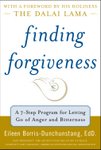The profound healing effect of forgiveness lies in its capacity to change the way we think. To help us understand how this happens I would like to give you a brief lesson in how our thinking developed and how it relates to what we call our unconscious mind.
At the turn of the 19th century a very prominent psychoanalyst by the name of Sigmund Freud laid the groundwork for understanding the psychoanalytical view on the way we think. He was especially brilliant when he introduced the concept of psychological defense mechanisms to keep unacceptable impulses, desires, and thoughts out of conscious awareness. Freud believed that one never strives so hard against something unless one was correspondingly attracted to it, even if that attraction remained out of awareness.
Although during Freud’s time psychology and spirituality were kept quite separate from one another that relationship began to change dramatically during the 1960’s. A “Third Force” known as Humanistic psychology came into existence, (with psychoanalysis and behaviorism being the first and second). From it emerged theorist such as Abraham Maslow, Carl Jung, and Carl Rogers. Their focus shifted from the psychoanalytical view that reduces human behavior and experience to unconscious sexual forces, to a view which respected our creative and spiritual strivings, placing a greater emphasis on the present and future rather than being chained to the past.
As Humanistic psychology further developed, a “fourth force” began to grow known to the field as transpersonal psychology. Transpersonal psychology began to explore the ‘S’elf, which they defined as our source of creativity and spirituality and beyond our personal self. This led humanistic and transpersonal psychology to look increasingly to spirituality as a guiding force for their investigations bringing them closer to the Eastern spiritual traditions, predominantly Hinduism or Buddhism.
With the advent of humanistic and transpersonal psychology we began to understand the struggles we were having in accepting our spirituality. As theories emerged they expanded that of Freud’s, opening up the possibility that within us is a divine spark or “Higher Self.” As these newer theories matured, Freud’s ‘ego’ took on a different meaning. Carl Jung who was a student of Freud defined the ‘ego’ as meaning ‘false self’ or the persona we put out for the world to see. This persona included our shadow, those parts of ourselves which we keep hidden. Jungian psychology then went beyond Freudian theory acknowledging that there is also a part within us that transcends our ‘ego’ and which makes up our higher nature. Unfortunately we have focused so much on creating who we think we should be, getting so wrapped up in our ego that we have come to deny our divinity.
According to Jung, when we denied our spiritual nature we imposed an image on ourselves based on a false belief that it was possible to be separate from our spiritual source. In accepting this belief as fact, we created a conflict within our psyche. The psychological pain of this conflict is so deeply imbedded within us that we experience this state of separation as anxiety. Karen Horney, a prominent psychoanalyst, describes this anxiety in terms of feeling isolated and helpless in a world conceived as potentially hostile.
The psychological term used to describe basic anxiety is neurosis. Carl Jung considered neurosis a warning issued by a higher authority, reminding us that our personality is in need of broadening to ultimately include the central “power,” that part which embraces all of who we are. Sigmund Freud was so afraid of this power that he constructed a thought system virtually invulnerable to the threat of spirit and a defense against our true “Self.”
How did this all happen? Why did we choose to focus on our “false” self as the ego is often called, to the detriment of the divinity within?
And how is this relevant to the understanding of the forgiveness process? Interestingly there is a myth common to Western civilization, the creation story, which explains all of this. Although we think of this story as a description of our physical creation, for some it is also a story of the birth of our consciousness and of the development of the ego thought system as we know it today.
Thursday, January 14, 2010
Subscribe to:
Post Comments (Atom)



No comments:
Post a Comment